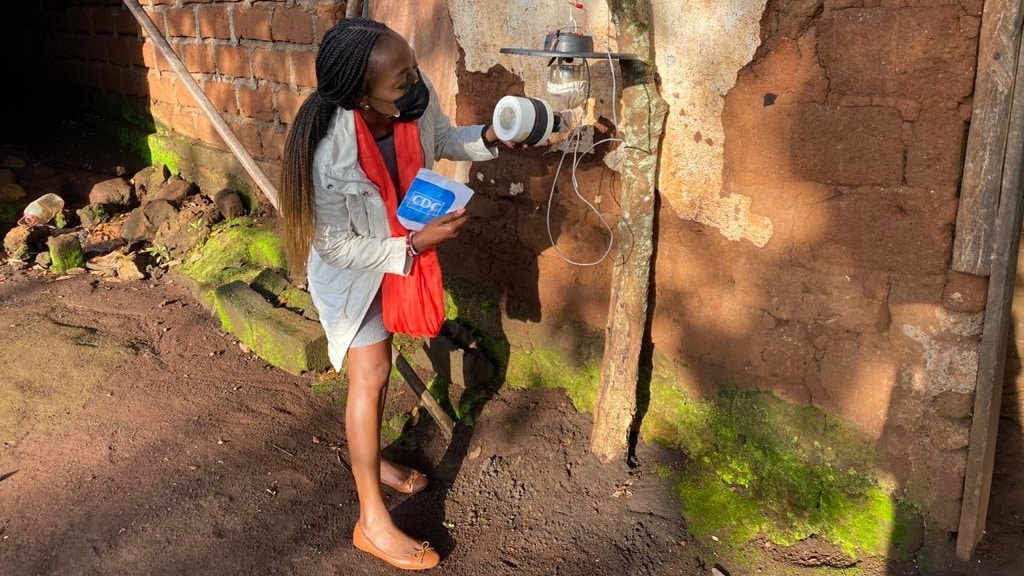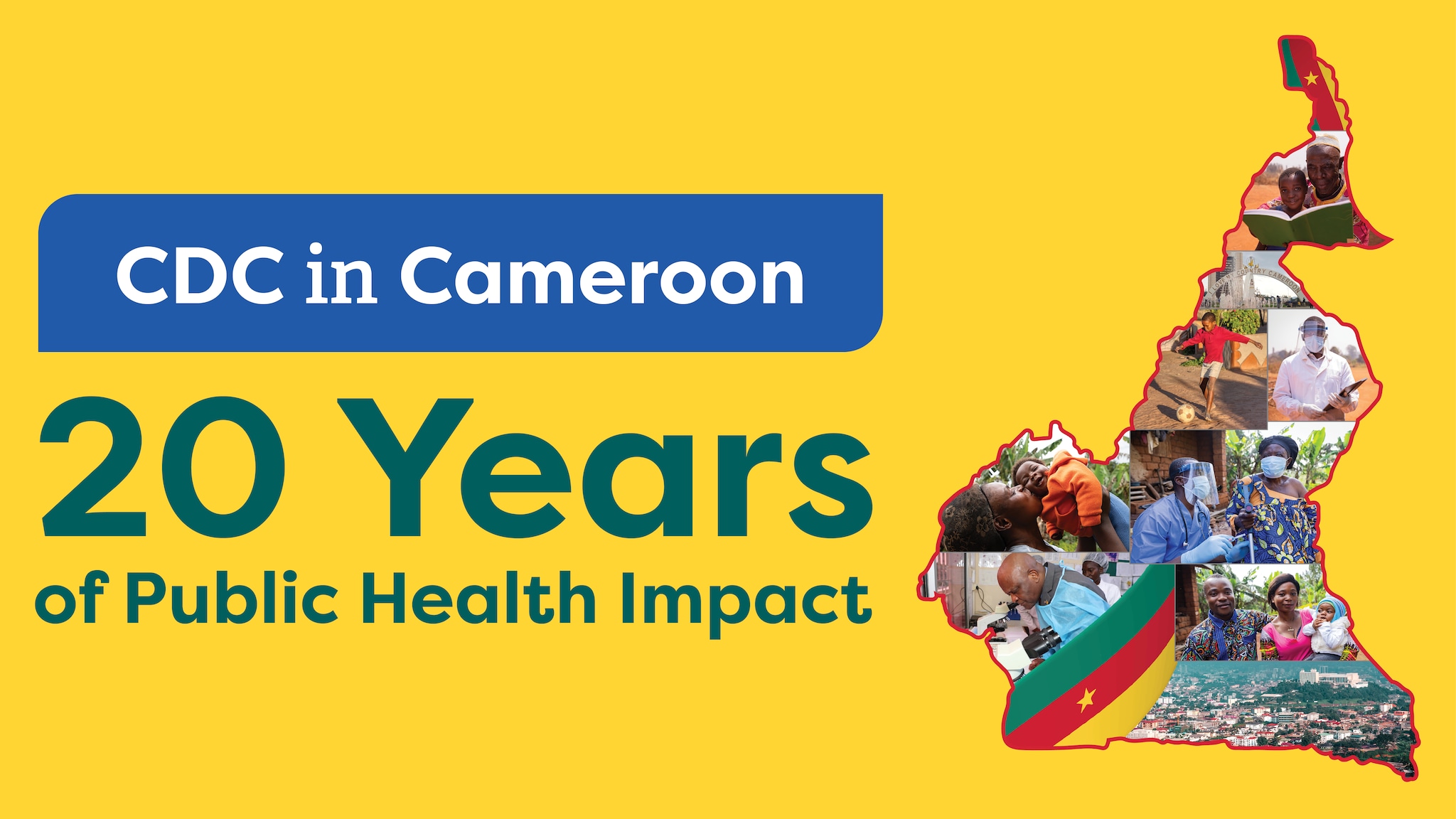At a glance
CDC has provided support to Cameroon since 1998 and established an office in Cameroon in 2004. CDC Cameroon works closely with the Government of Cameroon and partner organizations to build effective public health collaboration and partnerships to detect, prevent, and respond to global public health threats. Priority program areas include strengthening global health security and eliminating HIV, tuberculosis (TB), and malaria. CDC's work aims to protect the health of Americans and support public health around the world.

Overview
CDC has a long history of contributing to public health in Cameroon, starting in 1998 with an HIV laboratory and research program. Over the years, CDC has supported the Government of Cameroon in making significant strides to strengthen health systems and reduce illness and death. Collective efforts over the past two decades have boosted Cameroon's ability to prevent, detect, and respond to complex public health challenges. CDC provides lifesaving health services to fight COVID-19, HIV, tuberculosis, malaria, and other reportable diseases.
Key accomplishments
- Helped develop electronic data systems to inform clinical decisions and monitor patient outcomes in more than 340 health facilities across all ten regions.
- Supported the establishment of the National Public Health Laboratory, five International Organization for Standardization (ISO)-15189 accredited laboratories, and the first internationally certified blood bank in Central Africa.
- Trained over 2,000 disease detectives through the Cameroon Field Epidemiology Training Program (CAFETP). CAFETP trainees take part in more than 90% of disease investigations in the country.
- Provided expertise in over 100 outbreak investigations in Cameroon since 2017, including COVID-19, monkeypox, cholera, measles, polio, and other threats.
- Supported the introduction of the RTS,S malaria vaccine into the childhood immunization schedule, becoming the first country to take this action following pilot projects elsewhere in Africa.
- Boosted TB infection prevention and control activities to prevent transmission in healthcare settings.
Global health security
CDC builds on previous Global Health Security Agenda efforts in Cameroon, in alignment with the Global Health Security and Diplomacy framework. CDC collaborates with Cameroon’s Ministry of Public Health (MOH) to build and maintain core public health capabilities. Key capabilities include disease surveillance, laboratory systems, emergency management, and workforce development. Strengthening the national health data infrastructure is an overarching component of all activities. CDC’s efforts have strengthened health security in Cameroon, in the Central African region, and globally.
Workforce development
CDC supports training disease detectives through the Cameroon Field Epidemiology Training Program (CAFETP), established in 2010. The program consists of the two-year advanced FETP, nine-month intermediate FETP, and three-month frontline FETP. CAFETP has trained over 2,000 graduates from various sectors. CAFETP is the first fully accredited FETP program in Africa, accredited by TEPHINET in 2017. CAFETP is now training public health professionals from the Democratic Republic of the Congo, Republic of the Congo, Equatorial Guinea, Gabon, Central African Republic, and Chad. Since 2017, CDC has supported over 100 outbreak investigations in Cameroon, including COVID-19, Marburg, monkeypox, pertussis, cholera, meningitis, chikungunya, measles, polio, and other threats.
Emergency response
CDC and the Defense Threat Reduction Agency supported the inauguration of Cameroon’s Public Health Emergency Operations Center (EOC) in 2018. Its inauguration has led to more robust responses by improving multisectoral collaboration, data sharing, and decision-making. The EOC can be activated within 24 hours to coordinate emergency response activities for human and animal health threats. The MOH has undertaken at least 75 public health investigations with U.S. government support.
CDC’s Public Health Emergency Management Program has trained and certified MOH staff in emergency management. Certified staff have worked with regional districts to establish a similar program at the subnational level in Cameroon. The goal is to create and maintain a pool of well-trained EOC managers for human and animal sectors.
The global health security portfolio also includes efforts on:
- Reinforcing emergency warning, alert, and response systems
- Strengthening surveillance and diagnostics for priority infectious diseases and high-threat pathogens
- Reinforcing digital data flows to expedite outbreak response times
- Promoting national routine and catch-up childhood immunization
- Maintaining influenza sentinel surveillance in a key region
- Training rapid response teams at national and regional levels
- Supporting border health surveillance and alert capacities
- Reinforcing facility and community event-based disease surveillance
CDC also works with national partners to increase capacity for monkeypox laboratory diagnostics, viral genome sequencing, and ecological investigations.
HIV and TB
As a key implementer of the U.S. President's Emergency Plan for AIDS Relief (PEPFAR), CDC plays an essential role in the fight against HIV and TB. With unmatched scientific and technical knowledge and long-standing relationships with ministries of health, CDC is uniquely positioned to advance HIV, TB, and other infectious diseases and minimizing their risk from entering the U.S.
Through PEPFAR, CDC provides critical support to Cameroon's public health infrastructure, improving the country's ability to prevent, detect, and respond to HIV, TB, and other infectious diseases and minimize the risk of high-consequence pathogens from reaching the U.S.
Malaria

CDC has collaborated with partners to support implementation of malaria prevention and control activities in Cameroon since 2017. CDC-supported activities have included providing technical input in:
- Entomological monitoring and insecticide- and drug-resistance management
- Case management in health facilities and at the community level
- Programs designed to prevent malaria in pregnancy
- Seasonal medication provision to prevent malaria during peak transmission seasons
- Networks of disease detectives focused on malaria
Immunization
CDC collaborates with numerous partners to support routine vaccinations, including measles and polio, and responds to outbreaks in Cameroon. These efforts aim to increase vaccination coverage, protect more children from infectious diseases, and reduce the risk of the outbreaks reaching the United States.
CDC has supported multiple vaccination campaigns to protect young children in Cameroon from polio, including an April 2025 campaign that immunized nearly 8 million children nationwide and an August 2025 campaign that targeted nearly 200,000 children in four districts.

![[thumbnail] (hidden)](/global-health/media/images/2025/12/Cameroon_thumbnail.jpg)
